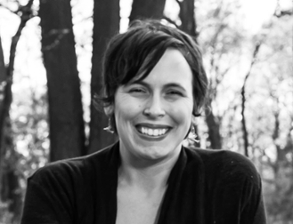- English Department
- Faculty and Staff
- Lauren Obermark
Lauren Obermark, Ph.D.
Education
PhD, English (Rhetoric, Composition, and Literacy), The Ohio State University
MA, English (Language and Literature), University of Missouri-Kansas City
BS, Secondary English Education, University of Missouri-Columbia
About
Dr. Lauren Obermark is a specialist in Rhetoric and Composition, which means she is interested in communication, broadly defined. That communication may be written, oral, visual, or a combination of modes and media; it may take place among humans but is also inherent in objects or environments. At the heart of all her work is an ongoing investigation of how rhetoric informs 21st-century practices of social justice, in academic and public spaces. When rhetoric is understood as entangled words and actions in the pursuit of transformative justice, it can be used as a framework to enhance how people listen, speak, and write to (and about) one another, and this idea is the throughline in all of Dr. Obermark’s research, teaching, and community engagement.
She is author of the book Engaging Museums: Rhetorical Education and Social Justice, forthcoming from Southern Illinois University Press in 2022. She has recently published articles about disability as an identity and accessible pedagogy, public memory of difficult history, and public rhetoric in/about Ferguson.
Her current work focuses on what she calls resistant remembrance, further theorizing how the work of memory (personal, social, and public) contributes powerfully to social justice movements. One way resistant remembrance is practiced is through the rejection of static, monolithic monuments and memorials and, in their place, community-created projects and conversations emerge. Her research about resistant remembrance is enriched by geospatial methods and technologies, as she works to locate, document, and analyze place-based manifestations of this practice in St. Louis as they relate to the the murder of Mike Brown and the Ferguson Uprising. She ultimately hopes to document stories and create maps about resistant remembrance for racial justice nationwide.
Research and teaching interests
- Museum and Memory Studies
- Public and Visual Rhetorics
- Social Justice Pedagogies
- Disability Studies
- Engagement and Participation
Frequently Taught Courses
Rhetorics of Public Memory
Description: This course takes the “tough stuff” of memory as an invitation to consider how and why we remember, commune around, and instruct others about particular places, people, and events while others remain minimized, absent, or erased. In other words, we will focus on the rhetorics of memory , or how memory is represented, communicated, taught, and, at times, avoided.We investigate and analyze the ways Americans remember, commemorate, and memorialize, especially at sites like museums, memorials, archives, and historical tours; grapple with public memory as a commonplace of identity expression, activist resistance, and social justice; and focus on the accompanying pedagogies of public memory, closely considering how the past is taught (or not taught) in curricular and extracurricular spaces.
The New “Normal”: Introduction to Disability Studies
Description: At least a sixth of the people in the United States have some kind of disability. That fact alone suggests that disability is worth considering when we think about American culture. This course is meant to help students become more informed about disability as a matter of identity, language, writing, power, education, politics, literature, art, and more.
Rhetoric and Social Justice
Description: This course offers a broad introduction to rhetoric as integral to language, communication, and meaning-making. We read rhetorical theories; apply theories to various scenarios and artifacts; and become more thoughtful practitioners of rhetoric. Specifically, we use rhetorical theories and methods to better understand events, protests, and media representation surrounding Ferguson, Black Lives Matter, and other rights-based social movements.
SELECTED PUBLICATIONS, TALKS, AND OTHER WORKS
Engaging Museums: Rhetorical Education and Social Justice. Southern Illinois University Press, spring 2022.
The Rhetoric of Participation: Interrogating Commonplaces in and Beyond the Classroom. Edited with Dr. Paige Banaji, Dr. Lisa Blankenship, and Katherine DeLuca, and Ryan Omizo. Logan: Computers and Composition Digital P/Utah State UP, 2019.
“Making Space for the Misfit: Disability and Access in Graduate Education in English.” College English. November 2019.
“ ‘Assurance that the world holds far more good than bad’: The Pedagogy of Memory at the Oklahoma City National Memorial Museum.” Rhetoric Review. January 2019.
“A Curation of Student Voices on Participation in the Writing Classroom.” The Rhetoric of Participation: Interrogating Commonplaces In and Beyond the Classroom. Eds. Banaji et al. Logan: Computers and Composition Digital P/Utah State UP, 2019.
“Public Rhetoric in the Shadow of Ferguson: Co-Creating Rhetorical Theory in the Community and the Classroom.” Composition Forum (Public Writing Special Issue). Summer/Fall 2017.
“Mad Women on Display: Practices of Public Rhetoric at the Glore Psychiatric Museum.” (Lead author; with Dr. Madeline Walter.) Reflections: A Journal of Public Rhetoric, Civic Writing, and Service Learning (Disability Studies Special Issue). December 2014.

